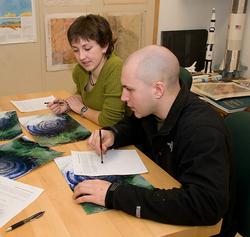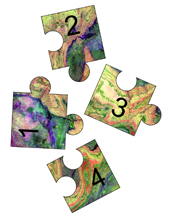Jigsaw FAQs
Won't it take more time than if I just lectured
- Although a jigsaw assignment takes time in class, you won't need to spend as much time lecturing about a particular topic. If planned well, the overall time commitment for using the jigsaw technique during class can be comparable to lecturing about a topic. This is particularly true if students do some of the team preparation outside of class.
How many team assignments should I have
- The number of team assignments governs how many students will be involved in each group for peer teaching and the group task. Four or fewer is ideal, and five is manageable. With more than five, peer teaching can take a long time, and it's harder to engage every student effectively in the group task.
- On the small end, there's nothing wrong with three or even two team assignments, and there is no reason why groups can't consist of two or three people.
- If you have a small number of assignments, and too many students on each team, simply have more than one #1 team, for example, during the team preparation time so that students can interact effectively.
What if I can't divide the class evenly into teams
- In the 15 years that I have used jigsaw, most of my classes have had a prime number of students. So, regardless of the number of assignments, I have almost always had uneven teams. I've just learned not to stress about it.
- Choose the number of assignments that makes sense, and then divide the class approximately evenly.
- If you have an extra team #1 person, for example, one group can have a pair of team #1 people who will share the peer teaching.

What is the ideal length for a jigsaw
- Jigsaws vary enormously in length, from activities that take less than a class period to those that take an entire three hour lab.
- Planning a jigsaw to span more than one class session does require a bit of planning. Consider where the natural breakpoints are (e.g., after the teams are prepared but before the peer teaching starts). Try to avoid breaking the jigsaw either during peer teaching or during the group task.
What if a student doesn't show up for class
- If this is an occasional problem, you can pair extra team people up, as described above. If you are short just one person, you can fill in yourself (or have a TA do it, if you have TAs).
- If absenteeism is a persistent problem, and your campus culture is such that penalizing a student for missing class is not an option, consider creating jigsaws for which all of the team preparation and group work is done during one class or lab session.
What if a student does a poor job peer teaching
-
I tell students that, as listeners, they have a responsibility to learn from the student who is teaching. If a listener isn't getting something, it's that person's responsibility to stop the peer teacher and ask for clarification.
-
Because anyone (including one of us!) might become confused in the middle of explaining something, I never penalize a student or a group for asking me to come over and clear something up. The group needs to have adequate information from each team assignment in order to complete the group task.
What if one group finishes early?
- Start by checking in with them to make sure that they are, in fact, finished and have done an adequate job.
- Consider having a "back pocket" assignment to give them that extends what they've already done so that they aren't chatting and distracting the other groups that are still working.
How do I teach students how to do a jigsaw?
- Prepare a very simple jigsaw that can be done entirely in class. Don't confuse them by describing the entire process before they start. Instead, describe each task as students come to it, but give them a heads up on what is coming next. For example, students need to know that they need to prepare their team assignments well enough to teach them to someone else. But they don't need, at that point, to know what will happen subsequent to peer teaching. At the start of peer teaching, students need to receive specific instructions for peer teaching and be aware that they must learn enough from others to complete a subsequent group task.
How do I get students to come prepared to class
- Most students do not know how to come to class well-prepared for peer teaching, because preparing to teach requires something different than most students are accustomed to doing for homework. Providing questions for students to answer in writing as they prepare their team assignments can help insure that they focus on what you think is important and are able to articulate it for themselves.
- Providing team time in class for students to outline the main take-home messages and how they will teach them is also crucial. If you simply ask students to "do the reading and come prepared to teach someone else about the topic", you will find that most students will be inadequately prepared for peer teaching.




ساحة النقاش